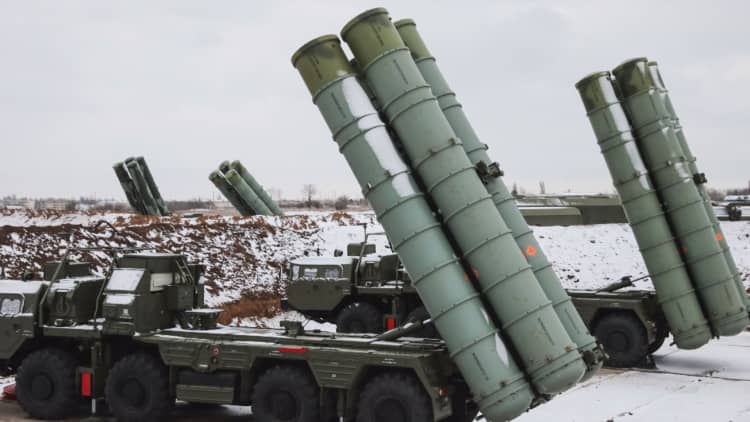WASHINGTON — Clouding the NATO leaders meeting in London this week is Turkey's decision to buy and begin testing of a Russian missile system — a move that is believed to pose a risk to the world's strongest military alliance.
Ankara faces blowback from NATO members as well as U.S. sanctions for completing its messy multibillion-dollar arms deal with the Kremlin.
Yet Turkey's government has shrugged off the potential sanctions since accepting delivery of the Russian S-400 missile system, and President Donald Trump himself has been sympathetic to Turkish President Recep Tayyip Erdogan's decision.
Last month, the two leaders met in Washington with seemingly no breakthrough on the S-400 issue.
Earlier this year, Trump said he could not blame Turkey for buying the S-400, a move that resulted in dropping the NATO ally's participation in the F-35 program.
"I don't blame Turkey because there are a lot of circumstances and a lot of ... problems that occurred during the Obama administration," Trump said in July. "This dates back to the Obama administration, which was a disaster."
Read more: Turkey proceeds with deal for Russian missile system despite US and NATO warnings
Trump then did not elaborate on whether he would impose sanctions on Turkey for doing business with the Kremlin. Under the Countering America's Adversaries Through Sanctions Act, or CAATSA, which the president signed in August 2017, Turkey could face economic sanctions for buying the Russian-made missile system.
"It's a tough situation. They're getting the S-400 and our statues and everything else — as you do that, you just can't order this equipment," Trump said. "And generally speaking, you can't order equipment period."
In efforts to deter Turkey from buying the S-400, the State Department offered in 2013 and 2017 to sell the country Raytheon's Patriot missile system. Ankara passed on Patriot both times because the U.S. declined to provide a transfer of the system's sensitive missile technology. Turkey can still get the Patriot, but only after meeting certain conditions.
"There is room for Turkey to come back to the table. They know that to make this work they need to either destroy, return, or somehow get rid of the S-400. At the same time, we certainly have not closed the door on their ability to acquire the Patriot battery, which does address their air defense needs," explained a senior State Department official, who spoke on the condition of anonymity.
The official also said that the timeline for imposing CAATSA sanctions "is not prescribed or absolute."
"There is still plenty of scope that could be applied as to where sanctions and the breadth and depth of sanctions could be imposed upon Turkey," the official added.
What's more, Moscow hopes to secure another deal with Ankara for more S-400 missile systems in the first half of next year, Alexander Mikheev, the head of Russian arms exporter Rosoboronexport said last month.
"Russia is using Turkey itself as a political missile aimed at the heart of NATO solidarity. The whole episode has become an embarrassment," explained Thomas Karako, director of the Missile Defense Project at the Center for Strategic and International Studies.
"Despite tough talk about CAATSA sanctions for buying S-400, they still haven't been imposed, five months after delivery. Allies and adversaries alike are drawing their own conclusions about the relationship between what the White House says it will do and what it does," he added.
And while the Trump administration has yet to impose sanctions on Turkey, the State Department has reiterated why allies should not buy arms from countries such as Russia and China.
"We certainly want to make sure that all of our partners understand what risks they may incur if they look elsewhere, particularly to near-peer adversaries that may be offering something that is of a subpar nature or may expose them to risk to exploitation or theft of their defense technology," said Clarke Cooper, assistant secretary for political and military affairs at the Department of State.
"We don't want to put to risk our defense technology, and we don't want our partners put at risk either," Cooper added.
Turkey's messy weapons deal with the Kremlin
In 2017, Ankara brokered a deal reportedly worth $2.5 billion with the Kremlin for the S-400 despite warnings from the U.S. that buying the system would come with political and economic consequences.
The S-400, the successor to the S-200 and S-300 missile systems, made its debut in 2007. Compared with U.S. systems, the Russian-made S-400 is believed to be capable of engaging a wider array of targets, at longer ranges and against multiple threats simultaneously.
All the while, Turkey became a financial and manufacturing partner in Lockheed Martin's F-35 jet, the world's most advanced fighter.
As Ankara's inevitable acceptance of the S-400 came to fruition, the Pentagon announced it would begin "unwinding" Turkey's participation in the F-35 program.
In October, the Pentagon's acquisition chief reiterated Turkey's removal from the colossal weapons program.
"There has been no change to return Turkey to the F-35 program. The S-400 air defense system, which is incompatible with the F-35, remains in Turkey," Ellen Lord, undersecretary of Defense for acquisition and sustainment, told reporters at the Pentagon.
"As I've said previously, Turkey makes nearly 1,000 parts for the F-35 and will continue to do so until Turkey's F-35 supply chain responsibilities transfer at the end of March in 2020," she added.
After his country was forced out of the multinational weapons program, Erdogan met with Russian President Vladimir Putin and attended an annual Russian air show in Moscow. After the August visit, Erdogan expressed interest in buying the Kremlin's Su-35 fighter jets.



